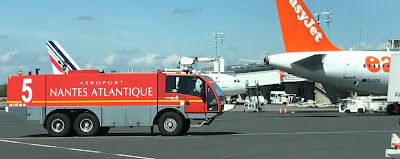Airport transfers
Airport transfers are a perfect example of tourism knowledge transfer at its most practical level. I use the example of ferry departure points in one of my lectures as a mystery unknown to the holiday visitor.
The airport transfer mystery has just surfaced for our group of 15 as we plan our fieldtrip to Nantes. How do you move 15 people, with luggage, from L’Aéroport Nantes Atlantique, Bouguenais (NTE) into the city centre of Nantes, within walking distance of, say, rue la Fayette or rue Descartes? If you have never been before, then it is very difficult, perhaps impossible to find that important piece of knowledge. UK travel company staff do not speak French so they cannot find the answer for their customers. Besides, who are they going to call? Google Maps tells us it is 12 kilometres and takes 19 minutes by car, but we do not have a car, we’ve flown in. Ah, you say, click on public transport in Google Maps, but Google says: ‘Sorry, we could not calculate transit directions’.
They work at NTE
Probably four or five hundred people know exactly what to do to make the journey as easily and cheaply as possible. They work at NTE every day or commute from there to Paris regularly. They even know the better walking route across the terminal if it is raining or to avoid the difficult road crossing or barriers. If we asked them, they would be surprised that we did not know, they would think us naïve, they may not even answer with sufficient detail for us to make the journey. For example, they may omit to tell us that we should buy our tram, bus or metro tickets before we cross the terminal. Or that a bulk buy of 10 tickets saves us 15% off the fare. Or that un billet aller retour is cheaper still, but only if you are staying in town 4 days or less. And should non-EU students bring their student cards for a reduction? But then, how can we ask them?
We might just search on Google, but do we know that we should type in : transfert depuis ou vers l'aéroport de Nantes par transports en commun ?
Tourism knowledge transfer at this granular level is a challenge for the travel industry. Any thoughts on how it can be tackled?

Comments
Post a Comment
Thank you. Please do a SHARE too...